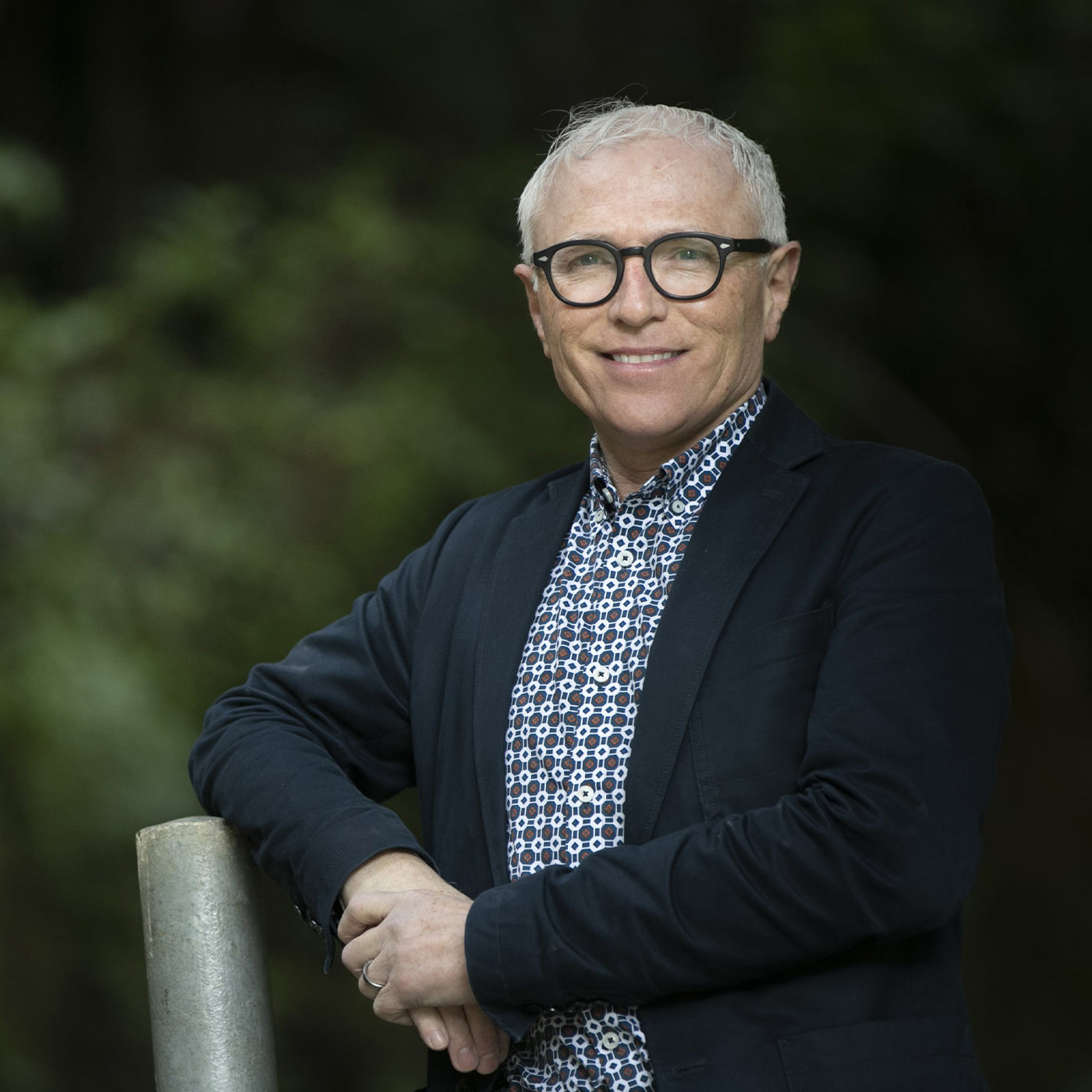Feature
Behind NZ's COVID response
Few academics become familiar household names in New Zealand. Fewer still achieve the widespread international exposure that Professor Michael Baker has experienced since the global pandemic began. As he continues to support this country's COVID-19 response he shares his insights.
Note: This story was written in September and reflects the COVID-19 landscape at that time.The apparently unflappable Baker's considered answers to even the hardest questions have generally been a calming influence within New Zealand, and are seen as wise counsel around the world.
His research-backed opinions and advice are still appearing on television, radio and in print, and his words are carefully weighed by health officials, politicians, business leaders and the general public.
So what prepared the University of Otago's Baker (Public Health, Wellington campus), for being thrust so spectacularly into the spotlight? How did he and several of his research colleagues become unexpected stars of the pandemic publicity phenomenon?
“Quite simply, we were researching and thinking about something like COVID-19 long before it happened,” says Baker. “For us, it wasn't a case of if but when we were going to be hit by an event like this.”
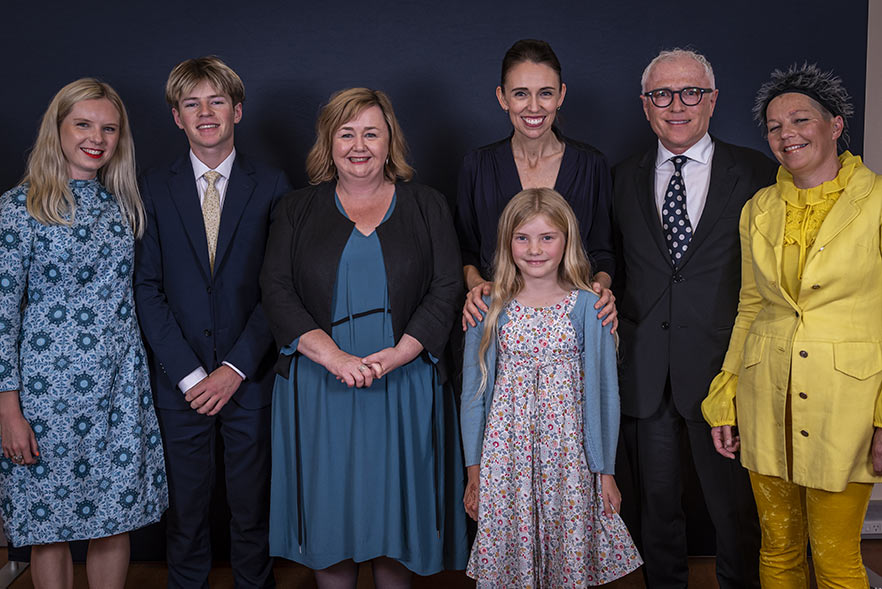
A proud moment: Professor Michael Baker, his wife Katie (right) and three of their four children (from left) Augusta, George and Euphemia with Research, Science and Innovation Minister Hon Dr Megan Woods and Prime Minister Rt Hon Jacinda Ardern when Baker received the Prime Minister's Science Communication Prize in April. Absent: The Bakers' eldest son Alexander, who is living in Canada. Photo: Royal Society Te Apārangi.
“… we were researching and thinking about something like COVID-19 long before it happened. For us, it wasn't a case of if but when we were going to be hit by an event like this.”
Epidemiologists didn't know exactly what they would be facing, but they'd researched and drawn lessons from past events, including the 'flu pandemics of 1918 and 2009 and the outbreak of SARS in 2003. When COVID-19 appeared they had a head start on what might be done.
Baker and colleagues had long been pushing governments to invest more in prevention and preparedness for pandemics but it wasn't until the virus arrived that health officials started to act on their advice. Baker was the first to call for an elimination strategy and rapid lockdown to fight COVID-19. He led the writing of the world's first published elimination strategy, which appeared in the NZ Medical Journal on 3 April 2020.
He had a record of giving good advice in response to threats. His first major public health role was helping to establish the world's first national needle exchange programme in New Zealand, resulting in substantially reduced HIV/AIDS infections among injecting drug users. More recently he had advocated for improving the food safety of fresh chicken, which contributed to a huge decline in campylobacter rates.
As Professor of Public Health at the University of Otago he is also director of the Health Environment Infection Research Unit. Previous roles include working as a medical adviser to a Minister of Health, for the Wellington Regional Public Health service, for the Environmental Science and Research (ESR) Crown Research Institute and for the World Health Organization (WHO).
Baker's recommendations to go into lockdown hard and early followed a WHO report on how China had largely contained the virus in Wuhan. He says the way the government responded has shown how proactive measures can protect the public from avoidable hazards.
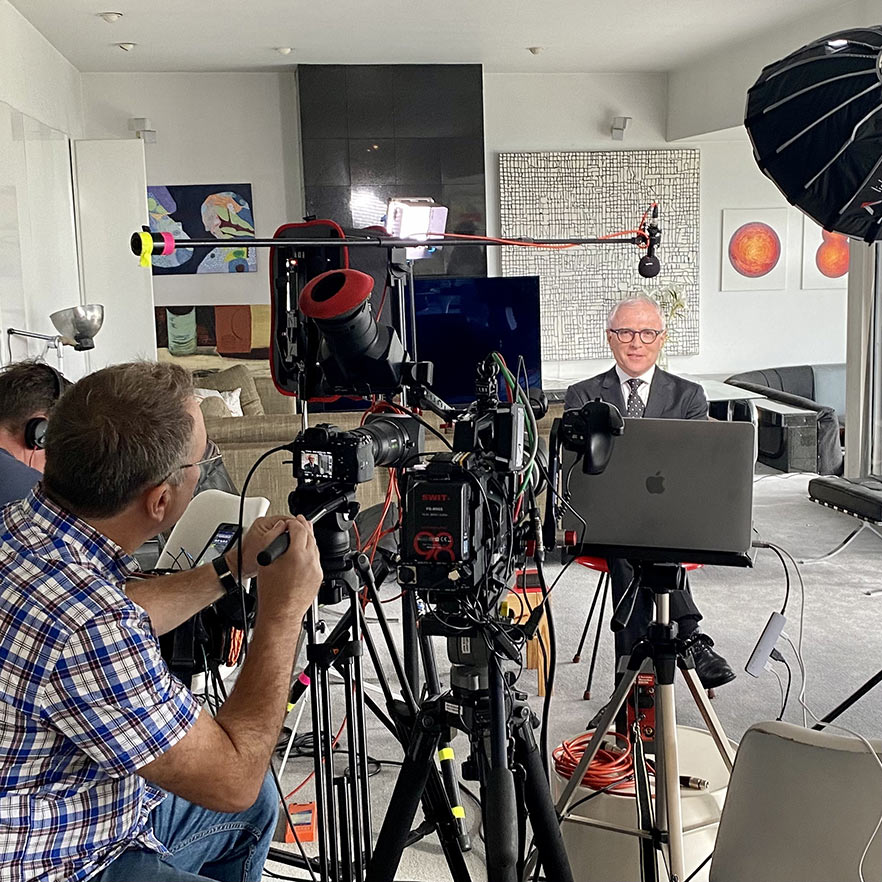
On camera: A crew films Michael Baker for an HBO documentary, in the living room of his Wellington home, in June 2021.
Photo: Katie Chalmers
In January 2020 he was asked to join the Ministry of Health's COVID-19 Technical Advisory Group (TAG), where he is still a member.
During a crisis, communicating science can be messy, says Baker. With fast-moving events, routine advisory processes start to break down. The communication systems that keep functioning are direct contact with key officials, political leaders and the media.
So at the peak of the 2020 crisis, Baker and a small group of Wellington colleagues disseminated their evidence-based ideas as blogs, and then talked about them via the media in what he calls the most intense period of his working life.
Science communication can be terrifying, says Baker. “You often must speak out before having the same level of certainty you might have when publishing research. There is also the problem of having your carefully planned messages sliced up into sound bites that convey a different meaning from what you intended.”
Consequently, Baker prefers live radio and television interviews and blogs such as The Conversation, which provide maximum opportunity for communicating what is intended.
Baker's effective science-based advocacy has helped earn him a growing list of accolades including becoming a Member of the New Zealand Order of Merit, the Prime Minister's Science Communication Prize, and Wellingtonian of the Year.
He is a member of the Science Media Centre Board and has received philanthropic support to establish a Public Health Communications Centre, which should start full operation early in 2022, supporting science communication in Aotearoa New Zealand.
After more than 2,000 interviews Baker is still one of the most called upon commentators on COVID-19 in New Zealand and internationally. Time zones are no barrier to calls from media across the world, if a little disruptive to family life with his wife Katie and four children in Wellington and elsewhere.
“Rapid, science-based risk assessment linked with early, decisive government action is critical to successful outcomes,” says Baker.
“In New Zealand's case we had a courageous government that was prepared to act proactively to protect public health. We also had an effective public service and health sector that could implement the elimination strategy, and trusted communicators in the Ministry of Health, like fellow public health medicine specialist Dr Ashley Bloomfield, who fronted the response day after day.
“Finally, the media in New Zealand performed well in communicating the science. The collective work of all these people has built a high level of public support and social licence for the COVID-19 response.
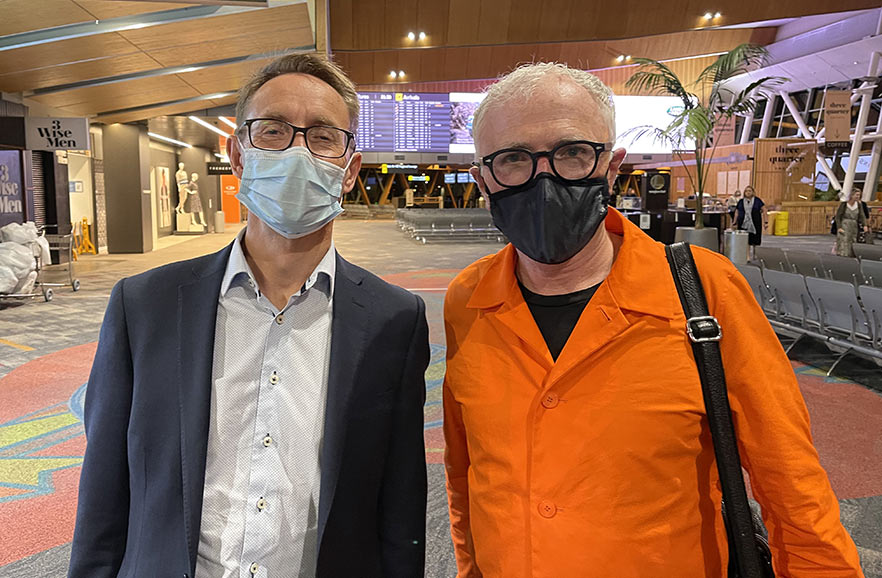
Masked up: Michael Baker with Director General of Health, Dr Ashley Bloomfield, at Wellington Airport in February 2021.
Photo: Katie Chalmers
“New Zealand's decisive response has shown that good science and good political leadership are a powerful combination that can protect both public health and the economy.
“The evidence suggests that countries that pursued elimination of COVID-19 performed much better than those that only suppressed the virus. Elimination has produced the lowest death rates, least time under lockdowns, and best economic performance compared with countries that have been trying to 'live with the virus'.”
New Zealand's situation compares favourably with some parts of the world where many individuals and even some leaders are taking life-threatening risks: ignoring safety advice, not following lockdowns, refusing vaccinations, promoting dis-information and even indulging in riotous, disease-spreading gatherings.
Baker says the first year of the pandemic was simpler in that the goal was to stamp it out and keep it out, and the elimination strategy was undoubtedly the optimal response.
“It saved an estimated 10,000 lives compared with the deaths we would have seen if we had a similar mortality rate to the UK. It also gave New Zealanders very high levels of freedom and supported a much better economic recovery than most OECD countries.
“Now we're in year two, the strategic choices have become more complex and more contested. We have safe and highly effective vaccines that are being rolled out, but we also have far more infectious virus variants. There are many unknowns, including viral evolution and the potentially severe chronic effects of COVID-19 infection.”
After months of bubbles, borders and bureaucracy, what now for New Zealand?
“People say, 'I can't wait to get back to business as usual', but there are a whole lot of things that we must do better,” says Baker. “I hope that is one of the lessons we learn from this terrible disaster.”
The recent endeavours of New Zealand's team of five million have led Baker to hope that they will inspire more ambitious action on other global threats like climate change, loss of biodiversity and high social inequities.
“My greatest hope as we emerge from the current pandemic is that we can use this newfound sense of agency to tackle the many other environmental, social and health challenges we face. Hopefully there is the will and confidence to build a more equitable and sustainable society.”
“I think one of the benefits of our successful response to COVID-19 is that the public has gained a greater appreciation of science and how evidence can be used in constructive ways. The public's understanding of the reasons for acting gives governments a social licence to take quite extreme measures to protect public health.
“The trajectory of COVID-19 has taught us that it is the behaviour of governments, more than the behaviour of the virus or individuals, that shapes countries' experience of the crisis.
“I do have a sense of idealism that we can actually do much better in New Zealand and globally at combatting the huge threats and challenges that we face. And I love the idea that good science, government leadership and collective action can make a positive difference in people's lives.
“My greatest hope as we emerge from the current pandemic is that we can use this newfound sense of agency to tackle the many other environmental, social and health challenges we face. Hopefully there is the will and confidence to build a more equitable and sustainable society.”
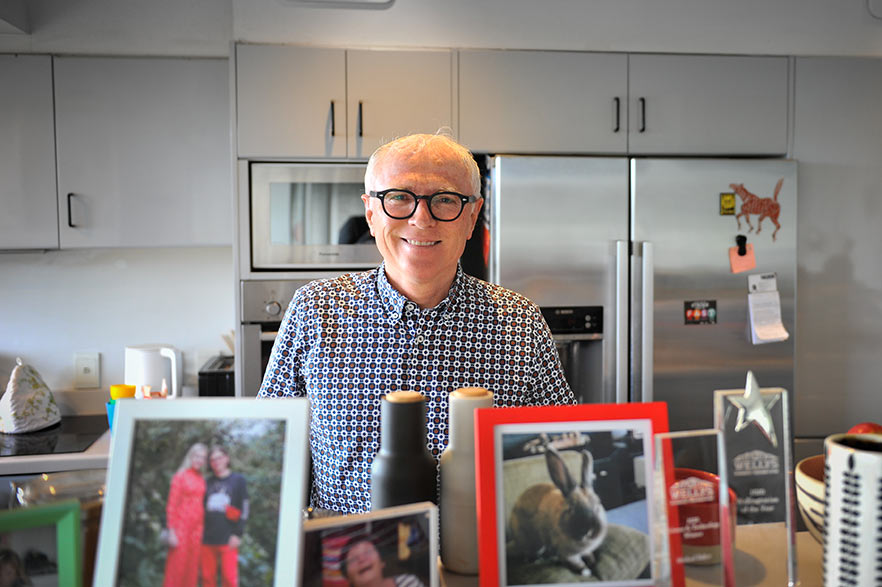
Relaxed at home: Michael Baker in his kitchen.
Photo: Luke Pilkinton-Ching
We need to create stronger public health agencies to be able to assess and manage potential future threats better as well as increase support for international health organisations such as the WHO, says Baker.
His consistent science-based advocacy has won him the Gama Foundation's Critic and Conscience of Society Award for providing independent, expert commentary on New Zealand public health issues from 2016 to 2020 and notably during the COVID-19 crisis. The Public Health Association also made him their public health champion for 2020.
He has continued his research, publishing more than 25 peer-reviewed papers on COVID-19, several in leading journals such as the New England Journal of Medicine, Lancet and BMJ, and working on scores of blogs and features with close Wellington-based Otago colleagues including Professor Nick Wilson and Dr Amanda Kvalsvig.
Otago Deputy Vice-Chancellor (Research and Enterprise) Professor Richard Blaikie says Baker's great skill is his ability to translate his expertise into practical and accessible information. “His efforts, and those of colleagues supporting him, have undoubtedly helped to save lives and reduce the wider impact of the pandemic.”
The COVID-19 response has demonstrated one of the benefits of research-intensive universities like Otago says Baker.
“This University has provided a large pool of expert scientists who have stepped up to fill many gaps in New Zealand's public health and science infrastructure. They have provided expertise in a range of areas, including epidemiology, microbiology, immunology, genomics, modelling and public policy that has been critical to New Zealand's successful response. Much of this input has been voluntary.”
The pandemic has given Baker an unexpected public profile. He receives so many emails that it is hard to reply to them all, and he is recognised in public and gets people wanting selfies with him.
He also gets eye-wateringly vitriolic hate-emails and abuse on social media from people who seem to hold him personally responsible for all of the unintended consequences of the pandemic response.
There have been surreal moments too. On Good Morning Britain, interviewer Piers Morgan was comparing countries' responses to the pandemic. Baker found himself arguing against the diametrically differing views of Sweden's former state epidemiologist. Bizarrely, he was an old friend who had formerly hosted Baker on sabbatical in Sweden.
The New York Times telephoned Baker for his views on the prospects of then-President Donald Trump when he was diagnosed with COVID-19. Baker admits that many thoughts went through his mind before he finally pointed out Trump's likely good prognosis despite some risk factors, and that was what was published.
Perhaps Baker's most surreal moment was attending the opening night of the play Transmission at BATS theatre, and watching actor Tim Spite impersonating him for the 90-minute show about the critical period in March 2020 when New Zealand pivoted from COVID-19 mitigation to elimination. Also enjoying the performance were Rt Hon Jacinda Ardern, Hon Grant Robertson and journalist Mei Heron who were the other characters portrayed.
Despite the time demands of the COVID-19 response, Baker continues to lead a very active programme of research focused on infectious diseases and environmental health.
The Health Research Council has just funded him to lead a five-year programme on the connections between infectious diseases and long-term conditions. “The research application was submitted before COVID-19 but now takes on greater importance as we learn about the tail of chronic disease this pandemic may be leaving in its wake.”
The programme, Syndemic Management of the Biology and Treatment of Infections and Chronic conditions (SYMBIOTIC), will explore relationships between infectious diseases such as influenza and long-term conditions such as chronic lung disease and diabetes, which often occur together, making them both worse.
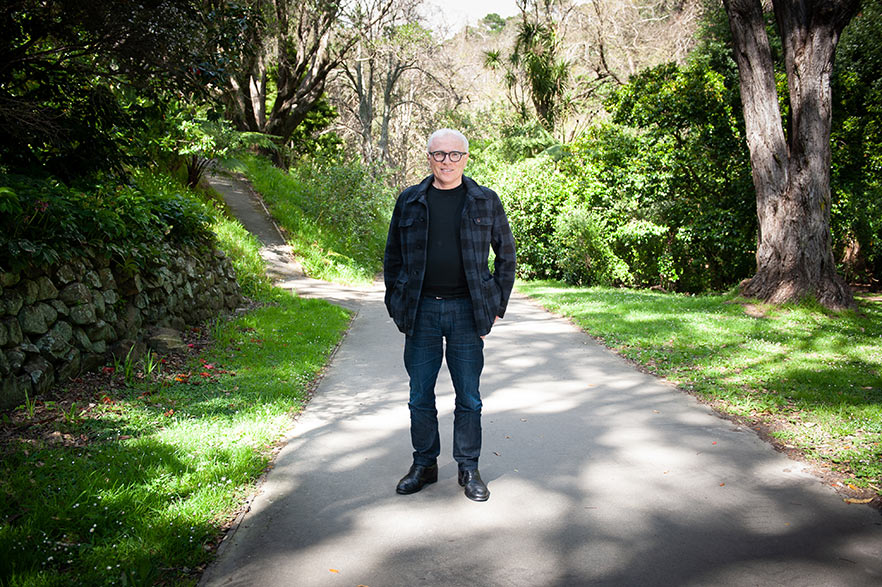
Out and about: Michael Baker enjoys a walk in Central Park, Brooklyn, near his Wellington home.
Photo: Luke Pilkinton-Ching
“The risks of infection and poor outcomes are strongly influenced by the presence of chronic conditions and poverty,” says Baker. “We want to better understand the two-way relationship between acute infections and long-term conditions to improve health and equity in New Zealand.”
One key area is rheumatic fever where he and colleagues have identified some very promising interventions they hope to trial soon, subject to funding applications now under review.
Another is the need for a collaborative research effort across the country to learn lessons from the COVID-19 response and apply them to the prevention and management of other public health threats, including future pandemics.
Baker would like to see the 2020s become a decade of elimination for other harmful infections. “The successful elimination of COVID-19 transmission in Aotearoa New Zealand for a sustained period has shown us the value of aiming high. With good science and good leadership, tough challenges that previously were thought to be impossible are now within our reach.”
NIGEL ZEGA
Professor Michael Baker: “Now we're in year two, the strategic choices have become more complex and more contested.”
Photo: Stuff Limited

